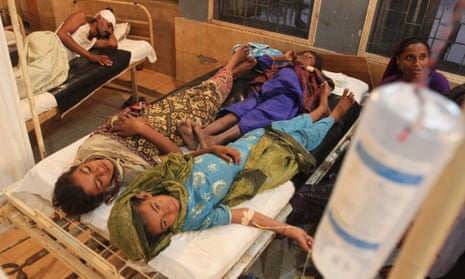According to a 2013 USAid report, public health schemes rely heavily on cash: to make payments for medical services, to pay health workers, to buy drugs at pharmacies. Yet it is becoming increasingly apparent that digital payments in rural, remote areas settings are quicker, easier, and safer. The likelihood of fraud drops as fewer hands are needed to transfer the money. And the transaction costs decline, making it cheaper for providers to reach rural populations. This translates into scale - a sought after goal in most public health projects - enabling organisations to cover larger areas with their services.
A digital trail also allows for easy data collection, auditing, and transparency, all of which is essential in health programming. Ultimately, USAid suggests programmes could create sustainable business models, becoming less dependant on donor funding and build relationships with new corporate partners. But what is the evidence?
Here are three projects that illustrate how technology, and more specifically, mobile money, can improve the reach and result of healthcare initiatives.
Helping fistula patients access transport costs
Obstetric fistula is a disabling condition that leaves women incontinent as a result of prolonged or obstructed labour. Despite corrective surgery being relatively cheap and easy to perform, hospital wards that could carry out the operation in Tanzania were largely empty.
“Transport is a very big barrier for these women,” says Erwin Telemans, chief executive of Comprehensive Community Based Rehabilitation hospital in Tanzania (CCBRT). With a choice between a two to three day trek or transportation costs varying between $15 and $60, many women decide instead to endure the pain and stigma.
Looking for a solution to their empty beds, CCBRT partnered with Vodafone Foundation to pay for the transport costs of these fistula patients. Using its network of 600 community workers who operate at village-level, the clinic transfers funds via mobile to a local community worker who then buys a ticket for the patient. Last year, 70% of the women treated for fistula at the hospital came through this mobile money scheme and the model is scalable. The clinic is now expanding the project to support children with cleft lip, using a similar M-Pesa scheme.
Encouraging better financial management for pregnant women
In Zanzibar, non-profit D-tree has partnered with mobile network Zantel to employ a similar strategy: paying for transport costs via mobile money to ensure that women give birth in clinics, not at home.
Since 2011, over 10,000 births were administered under the programme, with 30,000 mobile money transactions helping to enable the wider goal, pushing the percentage of pregnancies in clinics from 48% to 78%, according to Marc Mitchell, founder of D-tree.
For the programme to survive though, there has to be continued buy-in from all the participating bodies. To encourage better financial planning and to create an incentive for telecom companies to participate, D-tree is developing mobile wallets for pregnant women.
Mitchell says that the mobile wallet will shift some of the responsibility back onto the patient, helping mums-to-be contribute to the cost of their maternal care and teaching them some money management skills; encouraging them to save small amounts across the nine months of their pregnancy.
Facilitating health insurance payments
In Pakistan, Dr Asher Hasan is shifting the cost of healthcare from NGOs and the private sector to employers. Pakistan’s public healthcare system has serious gaps. Medicines, x-rays and tests cost extra, meaning that paying for a health emergency is still a challenge for many in the country. His Karachi-based social enterprise, Naya Jeevan, allows employers to sign workers up for health insurance for $2 per person per month.
While a string of mutlinationals including Unilever have signed up, Hasan says uptake is not happening as quickly as he wished.The problem was the sign-up process was too time-consuming, requiring detailed information about employees. Naya Jeevan now gathers that information directly from the employees, and Hasan is looking to streamline the process further using digital payments.
In 2013, 400 of nearly 900 insured households in Sultanabad, Karachi, were enrolled with United Bank Limited’s mobile banking platform, Omni as a 12-month pilot. These households were asked to make all their payments for clinical services digitally. The process coincedentally introduced more people to mobile banking for the first time and attached it to an important concern - their health.
Hasan now wants digital health and financial services to be further integrated. Naya Jeevan is now enrolling patients on a smart-card system, using a mobile banking platform, and transitioning to digital prescriptions, so medicines can be paid for with mobile money.
Read more stories like this:
Watch out M-Pesa, Equity Bank wants to transform mobile money in Kenya
Using mobile money to buy water and solar power in east Africa
Zimbabwe’s Econet Wireless and the making of Africa’s first cashless society
Advertisement feature: 10 things you need to know about mobile money
Join our community of development professionals and humanitarians. Follow @GuardianGDP on Twitter.

Comments (…)
Sign in or create your Guardian account to join the discussion